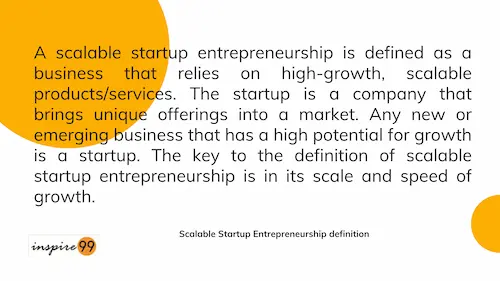Scalable startup entrepreneurship definition: The idea of entrepreneurship and small business are usually confused. The main difference between the two is in their ability to scale. In this article, we will discuss the meaning and definition of scalable startup entrepreneurship. We will also talk about the characteristics of a startup that help differentiate this from a small business. The term entrepreneur is derived from entreprende which means taking risk. This undertaking of risk is the common factor between a small business and a scalable startup. The differences between the two set them apart for the scale of growth, exponential ability to expand etc.
Scalable startup entrepreneurship definition
A scalable startup entrepreneurship is characterised by high-growth, scalable products. Although a scalable startup may start small, it has the potential to expand quickly. This expansion can either be global or located to a single geography. But the ability to create explosive growth defines a scalable startup entrepreneurship.

Such companies usually bring unique offerings into a market. They are innovative and are supported by technology that enable fast growth. Most times these type of startups are funded by external sources. The most common type of funding is equity funding that helps investors buy a stake in the company with the hope of a profitable exit. On the contrary, a small business might be less risky, but will have a lower potential of success. You can find more details in Difference between startup and small business from the related article.
Scalable startup entrepreneurship characteristics
Most startups follow a scalable pattern. They follow a few standard aspects as shown below. You can find a detailed piece on scalable startup entrepreneurship characteristics in the hyperlink.
Large Total accessible market (TAM)
Scale is the most important part of a startup. Hence the size of the available market will be the most important part of your business plan. This gives an investor the idea of the value and potential gains in this business
Unique selling point (USP)
The uniqueness of your startup idea defines its potential to beat the competition. A scalable startup with a strong USP can find better ways to penetrate the existing market and stand apart from its competition. The stronger your USP, the better scalable opportunities you’ll get.
Low customer acquisition cost
This is one of the reasons why digital businesses are so popular amongst startups. Technology helps scale up a business at a low cost. This also leads to lower customer acquisition costs. If this can be combined with a reduced churn rate, then such a startup idea will be the perfect one for an investor.
Ultimately, the scalable startup relies on how big the business can grow at ease. If you can replicate your product across different geographies, allied markets etc, then your business idea will be the perfect bet for a scalable startup.
What does scalable startup entrepreneurship mean?
Scalability is defined as the ability of your business to cope with increased demand. In most cases, increased demand for a business means that customers are liking what you offer and want more of it.
This is indeed a dream come true for most investors and business founders. Most entrepreneurs start off with a business idea with a passion to bring life to an idea and see it working (Turning an idea into a business). Scalability however transports the idea from a founder’s initial dream to something of value and substance.
It goes beyond proving that a business idea is capable of working. It shows that the business idea is capable of making an immense difference to a wide set of users and can create ripples in the business world. Managing the scalability of a business will also mean that the entrepreneurial venture has grown into a business and is capable of creating value at scale. This will mean increased customers and the corresponding team size to deliver consistent value to the end users.
What does it mean to scale a startup?
In order to understand the scaling of a startup, it is very important to differentiate between growing a startup and scaling it. Growth can refer to increased sales or even providing franchisees to operate on your business model. Scale is when you can create a standardised model to be extended to meet the increased demand.
Technological startups generally fall under the definition of scalable startups since they are so built for scale. Technical businesses need not expand their workforce on the same scale as most logistical businesses need to. If the technology is robust enough, you can manage scale at ease without having to increase your operational resources to similar proportions.
However, every business model is different and caters to different types of customers. It is important to understand your business model canvas
References:
What is scalability: https://www.investopedia.com/terms/s/scalability.asp
Churn rate: https://www.investopedia.com/terms/c/churnrate.asp

Pingback: 10 Definitions of entrepreneurship to inspire us into action - Inspire99
Pingback: What is a Small business entrepreneurship? - Inspire99
Pingback: 4 Key Differences between Entrepreneur and Entrepreneurship - Inspire99
Pingback: 3 Key Characteristics of Fabian Entrepreneurs - Inspire99
Pingback: Scalable Startup Entrepreneur Characteristics - Reverb Press
Pingback: 4 Key Traits for what makes a good entrepreneur? - Inspire99
Pingback: 3 Key Traits of a Tech Entrepreneur for success - Inspire99
Pingback: 5 Scalable startup entrepreneurship characteristics - Inspire99
Pingback: Four Types of Entrepreneurship for a Founder - Inspire99
Pingback: When does a startup stop being a startup? - Inspire99
Pingback: 5 Key Reasons on Why startups fail in India - Inspire99
Pingback: Think big Think fast Think ahead – Dhirubhai Ambani - Inspire99
Pingback: 6 Must-Have areas in business plan for startup - Inspire 99
Pingback: 4 Types of Entrepreneurs: Key Distinctions for Startup Founder - Inspire 99